Climate change presents a “code red” threat to humanity. The world is currently on a trajectory that surpasses the critical climate target of limiting the temperature increase to 1.5° Celsius above pre-industrial temperatures by 2030. Critical ecosystems are at risk. To prevent devastating effects on our planet and its people, we must rapidly cut global greenhouse gas (GHG) emissions.

As part of thai union, king oscar is committed to contributing its part to reduce greenhouse gas emissions by 42% by 2030 and to reach net zero by 2050.

These commitments cover Scopes 1,2 and 3 and Thai Union’s targets have been verified by the Science Based Targets initiative (SBTi).

Across our value chain, King Oscar will work to reduce and reach net zero emissions from owned activities, purchased goods and services, fuel and energy related activities, upstream and downstream transportation, and distribution.

Research suggests that small pelagic fish such as herring, sardines and anchovies have a smaller carbon footprint than perhaps any other animal protein sources. We aim to work with researchers in Norway to quantify these benefits and then offer these to our customers.
Best in Class Manufacturing
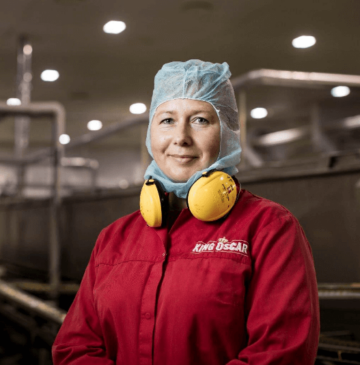

In 2023, we installed solar panels at Gniewino with the expectation that this will provide around 10% of the site’s electricity requirements and have completed projects to install LED lighting, optimize air compressor settings and reduce the number of pumps in our drying system. Most significantly, the installation of a new boiler reduced gas consumption by nearly 20% and the use of chemicals to pre-treat the water by 50%. Gniewino has also installed an upgraded wastewater treatment system that significantly lowers the chemical oxygen demand (COD) levels. The dry sludge that remains after the wastewater treatment is used for energy production by a local gas company.
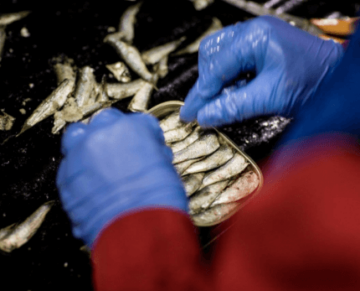

Gniewino sourced 40% of its electricity from renewable sources from 2022 and we aim to increase this percentage over time. Our plant in Svolvær, Lofoten, takes all of it its electricity from the local grid which is dominated by hydropower and wind power.
Sustainable Packaging
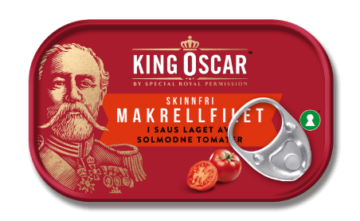
In terms of packaging, King Oscar predominantly uses steel and aluminium cans that are infinitely recyclable. Metal works very effectively for packaging – for example modern cans are already very light, they offer a long shelf life, helping to minimize food waste, and ambient storage requires no refrigeration with its associated energy consumption. The aluminium and steel cans used by King Oscar are also readily recyclable.
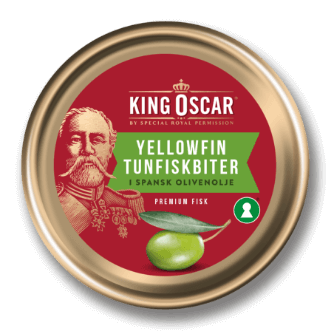
Through our SeaChange® 2030 commitment to 100% sustainable packaging by 2025, we will explore ways to reduce packaging weight, remove unnecessary plastic and increase recycled content. We also intend to undertake Life-Cycle Analysis research to assess new packaging options.
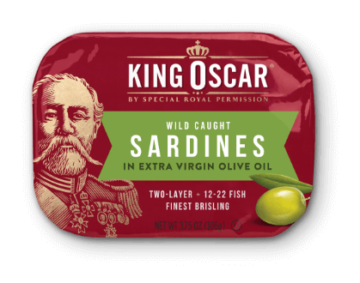
In 2023, 75% of King Oscar’s products were in fully recyclable packaging and a further 24% were in packaging that can be recycled albeit the recycling networks do not typically cater for them.
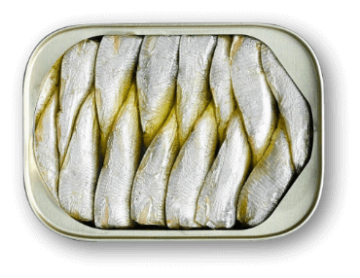
Additionally, aluminium cans used by the business were around 40% recycled content and steel cans were nearly 60% recycled content. In 2022, the Gniwieno factory switched their tertiary packaging for 615,000 cans per year from plastic shrink foil to cardboard, which resulted in an annual plastics reduction of 1071 kilograms.
- From our 2021 baseline
- For definitions of Greenhouse Gas Scopes 1,2 and 3 see: https://ghgprotocol.org/sites/default/files/standards_supporting/FAQ.pdf
- Nutrients and CO2 emissions, Koehn et al: https://iopscience.iop.org/article/10.1088/1748-9326/ac3954/meta
- Trivium Packaging’s statement on the recyclability, recycling, and recycled content of metals (Aug 2022)
